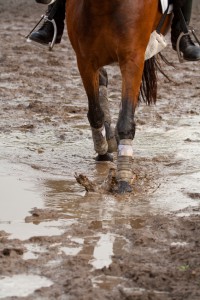 Muddy conditions require your horse to work harder and use more energy[/caption] Cold, muddy, wet and windy weather conditions all increase a horse's daily maintenance energy requirements; which can be raised by up to 30%. This is due to a multitude of factors; extra energy is used to maintain a correct body temperature, horses at grass spend less time grazing, instead putting their back side into the elements and more effort is needed to move when pulling feet out of thick mud. For horses that are good doers, such as native types, this can be a useful way to help them lose a bit of excess weight gained over the summer. However, older horses and poor doers can very quickly lose condition, which can be hard to regain over the winter months. In order to combat this there are a few simple rules to help your horses stay in good condition throughout the winter: Providing correctly fitting waterproof rugs with filling will help to keep your horse warm and toasty, reducing the amount of energy needed to keep them at the correct temperature. It is worth remembering that a rain sheet will flatten the hair underneath the rug, and can make your horse colder than having no rug at all! If your horse is living out through the winter adequate shelter is a must; thick tall hedges can provide a wind break, and wooden field shelters are ideal. While traditionally people increased their horse's hard feed rations in the winter, the majority of heat is generated from the fermentation of forage in the hind gut, so access to hay or haylage is very important when it comes to keeping your horse warm this winter! If your horse has ad-lib access to a good quality forage, and is still dropping weight adding an energy dense food source to the diet, such as micronised linseed, or oil, can help to encourage weight gain. If you are the owner of a good doer, and are concerned that constant access to hay may cause your horse to gain weight, soaking the hay for 30 minutes- 1 hour greatly reduces sugar levels, so you can still feed large amounts of forage. Horses can be put off drinking icy water, and have been shown to drink larger amounts of warm water if offered, reducing risk of colic and choke, especially when large amounts of hay or haylage are being consumed. Providing warm water and packing straw or insulating materials around a bucket can help to stop water freezing. Make sure you provide a free access salt lick, and consider providing salt or electrolytes in your horses feed to keep them drinking adequate levels to avoid impaction. Olivia Colton MSc Nutritional and Technical Coordinator, Feedmark
Muddy conditions require your horse to work harder and use more energy[/caption] Cold, muddy, wet and windy weather conditions all increase a horse's daily maintenance energy requirements; which can be raised by up to 30%. This is due to a multitude of factors; extra energy is used to maintain a correct body temperature, horses at grass spend less time grazing, instead putting their back side into the elements and more effort is needed to move when pulling feet out of thick mud. For horses that are good doers, such as native types, this can be a useful way to help them lose a bit of excess weight gained over the summer. However, older horses and poor doers can very quickly lose condition, which can be hard to regain over the winter months. In order to combat this there are a few simple rules to help your horses stay in good condition throughout the winter: Providing correctly fitting waterproof rugs with filling will help to keep your horse warm and toasty, reducing the amount of energy needed to keep them at the correct temperature. It is worth remembering that a rain sheet will flatten the hair underneath the rug, and can make your horse colder than having no rug at all! If your horse is living out through the winter adequate shelter is a must; thick tall hedges can provide a wind break, and wooden field shelters are ideal. While traditionally people increased their horse's hard feed rations in the winter, the majority of heat is generated from the fermentation of forage in the hind gut, so access to hay or haylage is very important when it comes to keeping your horse warm this winter! If your horse has ad-lib access to a good quality forage, and is still dropping weight adding an energy dense food source to the diet, such as micronised linseed, or oil, can help to encourage weight gain. If you are the owner of a good doer, and are concerned that constant access to hay may cause your horse to gain weight, soaking the hay for 30 minutes- 1 hour greatly reduces sugar levels, so you can still feed large amounts of forage. Horses can be put off drinking icy water, and have been shown to drink larger amounts of warm water if offered, reducing risk of colic and choke, especially when large amounts of hay or haylage are being consumed. Providing warm water and packing straw or insulating materials around a bucket can help to stop water freezing. Make sure you provide a free access salt lick, and consider providing salt or electrolytes in your horses feed to keep them drinking adequate levels to avoid impaction. Olivia Colton MSc Nutritional and Technical Coordinator, Feedmark
Winter tips for poor doers
12 Dec 2014
